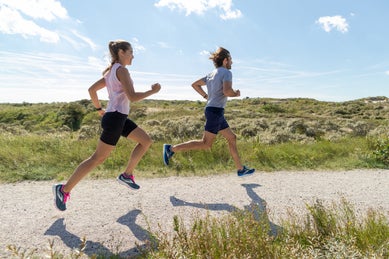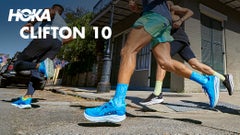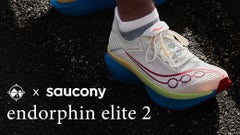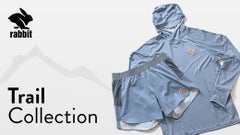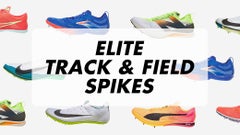Ultimate Guide to Sustainable Running Gear
Updated: October 1, 2024 by Caroline Cross

Importance of Choosing Eco-friendly Products
As runners, whether we're hitting the road or the trails, nature is our playground. Here at Running Warehouse, we want future generations to be able to enjoy the outdoors as well, and we believe everyone has a part to play in creating a more sustainable future.
From minimizing the negative impacts on our environment and responsible management of natural resources to the health benefits of limiting exposure to harmful chemicals, making the conscious choice to choose eco-friendly products is rewarding and impactful to us all. In the fast-paced world of fast fashion, by selecting the alternative route of sustainable products, we are all doing our part in helping to reduce textile waste from filling up our landfills, aiding in conservation, and supporting safer manufacturing processes at every step.
Overall, choosing eco-friendly products is a win-win, both for you and the planet. Read on to learn about how we highlight sustainable products and what our brands are doing to create more eco-friendly running shoes, clothing, and accessories.
How We Identify Eco-friendly Products
We highlight the sustainable products on our site by featuring a green leaf icon next to clothing made from at least 75% recycled or renewable materials and footwear constructed from at least 25% recycled or renewable resources. Check out our selection of sustainable styles with our eco-friendly men's and women's gear. We applaud the brands in our running community making a positive impact by implementing sustainable practices and cheering on those with lofty goals for the future. We hope to include more brands as they take steps toward achieving their sustainability objectives.
Eco-Friendly Steps Brands Are Taking
• Using recycled materials, like polyester, in running apparel, shoes, and accessories. Ciele's headwear, for example, is made from sustainable polyester recycled from plastic bottles certified by REPRIEVE, helping to keep plastic bottles out of oceans and landfills and reducing carbon emissions. In addition to using sustainable materials, shoe brands like Hylo and On offer recycling programs where you can recycle your old shoes to reduce environmental waste, and several brands also use recycled packaging.
• Utilizing renewable materials such as wool, Tencel, and eco-content midsoles. Hylo incorporates sugar cane and corn fibers in their footwear, while On uses plant-derived castor beans. To reduce the use of synthetic foam and lower the negative impact on the environment, ASICS also uses bio-based materials in the components of their shoes.
• Implementing eco-friendly manufacturing such as carbon neutral credits that Brooks has applied to their popular Ghost shoes. Brands like ASICS use environmentally friendly fabric dying solutions to reduce water usage and renewable energy to reduce CO₂ emissions in the supply chain. On has been employing innovative eco-friendly technology to upcycle carbon emissions in the material construction of their footwear and apparel, moving away from the reliance on fossil fuels.
• Eliminating the use of PFAS, a.k.a forever chemicals, in textiles. Patagonia, a brand devoted to the planet and a pioneer in the field of sustainability, has implemented safer, PFA-free alternatives in the fabrics and coatings of its water-resistant jackets and gear. The North Face and Arc'Teryx are transitioning to non-PFC DWR finish in their waterproof and windproof products. Due to statewide initiatives banning PFAS in 2025, GORE-TEX has implemented changes to meet safer alternatives for waterproof apparel and footwear and created a new ePE membrane, free of (fluorinated) PFC chemicals with a reduced carbon footprint that is safer for humans and the environment.
Sustainability Certifications & Organizations
From safer manufacturing and labor practices to sustainable farming and conservation, learn about the sustainable organizations and certifications and the brands that have partnered with them for a healthier and more sound environment.
bluesign

Switzerland-based bluesign technologies is a company that closely monitors, audits, and certifies the manufacturing process of materials worldwide, from the factory line to the finished product. Bluesign does this by taking a trifold approach to sustainability, focusing on three main areas: people, resources, and the environment. In coordination with their system partners (chemical suppliers, manufacturers, and brands), bluesign eliminates the use of and exposure to hazardous chemical substances in the pre-production phase for the overall health and safety of workers, consumers, and the planet. Bluesign also engages with factories to help them operate more efficiently by ensuring they're producing less emissions and pollutants and managing resources like water, energy, and chemical usage responsibly. This three-pillar approach is central to bluesign's comprehensive certification process, which requires annual re-certification of materials. According to bluesign, for a product to be officially certified, it needs to contain at least 90% bluesign-approved textiles (fabrics and yarns) and a minimum of 30% bluesign-approved accessories (buttons, logos, threads, and zippers).
Partners
| Patagonia | Salomon |
| adidas | The North Face |
| ASICS | Vuori |
| Brooks | Arc'teryx |
| rabbit | Nike |
| Saysky | Pressio |
| Ciele | Puma |
| GORE-TEX |
OEKO-TEX

The OEKO-TEX Association, headquartered in Switzerland with offices worldwide, focuses primarily on human-ecological health and safety by examining the chemicals and dyes used in textile production. The neutral and independent OEKO-TEX institutes conduct stringent lab tests on the release of harmful substances and toxic chemicals from a clothing's material. For a product to obtain the Standard 100 label certification, every component and ingredient, from the outer materials right down to the buttons, threads, zippers, linings, prints, and coatings, must be non-toxic. The closer the material comes into contact with the skin, the higher the testing requirements for it to be deemed harmless. OEKO-TEX's international standardized test criteria are updated annually to stay current with new scientific information or legal requirements. Ultimately, OEKO-TEX's goal is to help consumers make wise decisions by ensuring that products are environmentally friendly, manufactured fairly, and safe for everyone's health.
Partners
| Craft | Brooks |
| Vuori | NNormal |
| Puma |
Better Cotton Initiative

Better Cotton Initiative (BCI) is a not-for-profit organization with the largest cotton sustainability program in the world. The goal of BCI is to develop Better Cotton as a sustainable, global commodity and improve the overall production of cotton, starting with the farmers and the land it grows in. BCI's approach to sustainable cotton covers three points: environmental, social, and economic. Since cotton production involves issues concerning the use of insecticides and pesticides, excessive irrigation, and forced labor, BCI seeks to reduce these negative environmental and social impacts and increase the economic livelihood of farming communities. Farmers receive training from BCI on fair work principles, efficient water usage, and how to care for the natural habitat and maintain healthy soil by using safer, less harmful alternatives for crop protection.
Members
| New Balance | Nike |
| adidas | Roark |
| ASICS | Puma |
Forest Stewardship Council

Forest Stewardship Council (FSC) is an international, not-for-profit NGO (non-governmental organization) focusing on responsible forestry in the supply chain. This includes certifying wood, raw materials, and fibers from sustainably harvested trees. For forests to be FSC certified, they must meet an extensive list of criteria and principles for responsible forest stewardship relating to the environment, social benefits, and economic health of local communities.
More brands are partnering with FSC and moving toward eco-friendly packaging and fabrics, from paper catalogs to hang tags and cardboard boxes to recyclable materials and natural fibers. Some brands like Patagonia and New Balance have taken the initiative of sourcing lyocell, a plant-based fiber, from FSC-certified farms. Lyocell is naturally derived from the pulp of trees and produced using recycled water and non-toxic substances. It is a more sustainable alternative to cotton since it doesn't require excessive water usage or pesticides. Because it is a soft, moisture-wicking, and stretchy fabric, lyocell is also ideal for activewear and a sustainable substitute for polyester. Forests play a vital role in maintaining a healthy ecosystem, and FSC's objective of "Forests For All Forever" is a motto we can all stand behind.
Certified
| Patagonia | Brooks |
| New Balance | Saucony |
| On | ASICS |
| Under Armour | The North Face |
| Salomon | Craft |
| Skechers | Puma |
Fair Trade USA

Fair and safe labor standards in the manufacturing industry are a vital part of sustainable production. Since garment production is a labor-intensive and tedious process that involves hours of meticulous sewing, cutting, and trimming, many human rights violations occur in factories. Fair Trade USA's mission is to advocate for fair labor and trade standards, reduce poverty, and ensure healthy economic growth in farming communities. It does so by championing better living wages, safer working conditions, and community development funds, which directly empower farmers and laborers, improving their schools, clinics, transportation, and other services. For products to be Fair Trade Certified, they must meet strict social, economic, and environmental requirements such as improved working and living conditions, sustainable livelihoods, and cleaner agricultural practices (such as prohibiting the use of GMOs). By purchasing products with the Fair Trade logo, consumers are supporting fair business practices, the basic human rights of workers, and the conservation of the environment.
Fair Trade USA Partners
| Patagonia | Roark |
| Arc'teryx | Ciele |
Sustainable Apparel Coalition

The Sustainable Apparel Coalition (SAC) is a worldwide, non-profit, collaborative partnership with leading apparel, footwear, and textile brands, manufacturers, and retailers with the common goal of reducing the environmental and social impacts of the supply chain. Members of SAC developed the Higg Index, which uses five tools to accurately measure and score a company's or product's sustainability by its social and environmental impact, such as water usage, carbon emissions, and labor conditions. The SAC uses the annual data from the Higg Index to evaluate and improve the industry's sustainability performance, increase accountability, and provide consumer transparency.
Members
| Patagonia | Brooks |
| New Balance | Saucony |
| Nike | ASICS |
| Under Armour | On |
| Salomon | Hylo |

